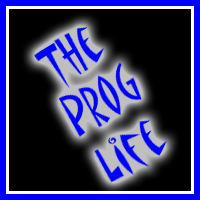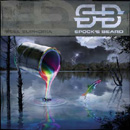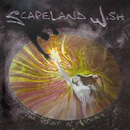by Clayton Walnum

Way back in the very first edition of "The Prog Life", I made clear my feelings about Neal Morse's departure from Spock's Beard. Not being a religious person, I guess, had a lot to do with the fact that I couldn't grasp how, after his expressing such heartfelt thankfulness for his success with the Beard, Neal up and quit to chase god (lowercase deliberate). I confess to being a little bitter about the whole thing, what with Spock's Beard being one of my favorite groups, not to mention that I considered Neal Morse a musical hero. Let's face it: Rare is so much talent crammed into one package (composer, singer, keyboardist, guitarist, drummer....)
While the rumors that I burned, on my front lawn, a stack of Britney Spears CDs in offering to the Great Gods of Rock 'n' Roll are completely false, I did cancel a lengthy analysis that I had been writing on the Beard's latest album at the time, Snow. Considering that the analysis was half complete and had already eaten up more than two days of my precious writing time, I guess you could say that I was pretty pissed off. I don't always handle disappointment well, as my tantrum at having to sit at the back of the theater for The Matrix Reloaded attests. Before they tied me to a seat and gagged me with a hot dog, I managed to stuff a half a bucket of popcorn up the theater manager's ... uh, I guess we don't need to go there.
(For those who are wondering about the movie, it featured little plot, but made up for that with some of the most awesome and riveting action scenes ever filmed. For those of you wondering about using hot dogs as gags, don't bother. A little chewing and swallowing was all I had to do to start screaming again, although given the fat content of theater dogs [2,145 grams and 21,000 calories per bite, not counting the chili, cheese, and chocolate], I paid for the feat by gaining 32 pounds. In fact, I'm writing this from my treadmill, on which I've been running for three days now in an attempt to regain my sexy figure.)
But I've gotten off track, which is not unusual given that I suffer from Attention Deficit Disorder (ADD). In fact, I remember a time when...
-- Focus, Clay. Focus.
 The release of the new Spock's Beard album, Feel Euphoria, begs a return to my discussions of Neal Morse, Spock's Beard, and maybe even chocolate-dipped hot dogs, if we have room. In fact, as if you couldn't tell from this column's title, I've dedicated this entire edition of "The Prog Life" (sans the "Clay's CDs in Rotation" section) to SB and whether or not they've successfully weathered the loss of Neal Morse. More importantly, though, please note the correct use of both the words "whether" and "weather" in the previous sentence. Send your congrats via email.
The release of the new Spock's Beard album, Feel Euphoria, begs a return to my discussions of Neal Morse, Spock's Beard, and maybe even chocolate-dipped hot dogs, if we have room. In fact, as if you couldn't tell from this column's title, I've dedicated this entire edition of "The Prog Life" (sans the "Clay's CDs in Rotation" section) to SB and whether or not they've successfully weathered the loss of Neal Morse. More importantly, though, please note the correct use of both the words "whether" and "weather" in the previous sentence. Send your congrats via email.
To tell you the truth, I never doubted for a minute that the new Spock's Beard would be successful on at least some level. Why? Because, along with the fact that SB is a collection of talented musicians, new front man Nick D'Virgilio is one of those people that seems to be able to do anything musically. The possible problem was that Nick is at least as commercially minded as Neal was wont to be. Maybe more. Let's face it: Among other things, it was Neal's wonderful, yet immensely hummable, melodies that prompted so many critics to label the Beard as only mildly progressive. Under Neal's direction, not only was the previous SB album, Snow, more mildly progressive than ever before, but it was also a bona fide Christian-rock album. So where was Nick's new influence going to take the Beard?
Well, now we know.
Thankfully, the Beard have stayed close to the tree that bore them such delicious fruit in the past. In fact, I would say that the new album carries on pretty much where Snow left off -- that is, lots of crankin' hard rock, with plenty of progressive attitude. While the album falls short of fully symphonic, it emits a solid progressive sensibility, featuring well-written songs put together from clever arrangements, great recordings, and top-notch production. In short, the Neal-less Beard is doing just fine, thank you. If it weren't for the change in lead vocals, I'm not sure most people would notice a change at all. This goes to show that, in spite of the fact that Neal Morse wrote most of the music for Spock's Beard version 1.0, the final results have always been a collective effort, with every SB member getting his two-cents worth in somewhere.
Herewith is a track-by-track rundown on what you can expect when you slap Feel Euphoria into your CD player. Each song concludes with a "prog meter" value, which is, in my opinion, the track's progressiveness on a scale from 1 to 5, with 5 being the most proggy.
"Onomatopoeia" -- This is a solid, hard-rock piece in the Deep Purple vein. Not overtly progressive, which makes it a risky opening number for a band whose new line-up is being closely watched by the prog world. The arrangement, however, includes a sudden meter and mood shift, replete with layered vocals and mellotron-like strings that definitely add proggy spice. Ditto the cool mellotron washes in the song's outro. The confident playing and excellent vocals show that the new Beard is working as hard as ever before. Prog meter: 2.
"The Bottom Line" -- Style-wise, this proggy number would have fit perfectly on Snow. The song opens with some Genesis-like instrumental melodies, before the first verse. The main verse melody is sort of a cross between the Beatles and Frank Zappa, if you can believe it, with each verse ending with glorious multi-part, harmony vocals. You'd almost swear you can hear Neal in there somewhere. After a couple of verses, the song moves into a slower, atmospheric section, before changing again into a more upbeat section. Prog meter: 4.
"Feel Euphoria" -- This is a slinky, sexy number that features a breathy, yet, somehow tough, lead vocal from D'Virgilio. The choruses bring to mind UK, the great John Wetton/Bill Bruford/Alan Holdsworth prog vehicle from the 70s. This song demonstrates what I mean by progressive attitude. "Feel Euphoria," the song, isn't progressive in the strict sense, but is far from commercial. Like most of the tracks on this album, you can expect a couple of meter and mood shifts. Have I mentioned D'Virgilio's terrific vocals? Also, Alan Morse's guitar solo at the end of this number is absolutely insane. Ditto Ryo Okumoto's awesome organ solo. Wow! Prog meter: 3.
"Shining Star" -- This is the album's obligatory attempt at a radio-friendly single. Nothing progressive here, but the track demonstrates that the Beard can turn out commercial fare with aplomb. A genuinely hummable melody and a powerful bridge work together to make this track the hit that SB will probably never have. Prog Meter: 1.
"East Of Eden, West Of Memphis" -- Here, the Beard show how well they have mastered the art of contrast in their songwriting. Specifically, the rolling, monophonic verses lead directly into contrasting melodious choruses. This song, too, features a stylish shift in the center, with lots of proggy soloing underpinned by mellotron washes. Some Flower Kings-like instrumental sections. Alan Morse turns in another wailing guitar solo. Man, that dude can play! A very Beatle-ish ending that could have been produced by Sir George Martin himself. Prog meter: 3.5.
"Ghosts Of Autumn" -- This track is exactly what you might expect from its title, a piano- and vocal-based ballad. A great song, with D'Virgilio channeling Neal Morse on the vocal. The Genesis-like instrumental centerpiece introduces a few odd time signatures, not to mention a build-up into a powerful, climactic ending. Prog meter: 3.
"A Guy Named Sid, Parts I to VI" -- A six-part opus, clocking in at over 20 minutes, "Sid" is, not surprisingly, the most progressive piece on the album, although that's as much due to the fact that it's a multi-part suite as it is to the progressiveness of any one part. A lot of this stuff would have fit the Snow album just fine. In fact, "A Guy Named Sid" is not unlike a mini-Snow, minus the Christian references. Styles run the gamut, from a cool spy-theme-like intro to magnificent, almost Gentle Giant-like, choir sections. Deep Purple influences, again, are hard to miss, especially due to Okumoto's overdriven organ parts accompanied by Alan Morse's Blackmore-like rhythm guitar. As with many of the other tracks, terrific keyboard and guitar solos adorn the arrangement, which closes with a powerful Yes-like climax. Prog meter: 4.
"Carry On" -- Like "Ghosts Of Autumn," "Carry On" is another straight-forward ballad. This one sounds as if it could have been written by Neal Morse himself. In fact, D'Virgilio's vocal, too, brings Morse to mind. The track's regal sound concludes the album with power and class. Prog meter: 2.
All in all, the Beard still sounds like the Beard. Although the entire band is in full force here, Nick D'Virgilio deserves special kudos for so expertly taking up Neal Morse's rein as the SB front man. Is Spock's Beard still progressive? Absolutely. But, no matter how you slice it, Feel Euphoria is one terrific album. Neal who?
Clay's CDs in Rotation
As has become the custom in "The Prog Life," this is the part where I list the CDs that have dominated my ears in recent weeks. As always, my CD player is stuffed with lots of great stuff, and considering that I listen to probably a dozen CDs a day, I have plenty from which to choose. Still, some albums keep drawing me back for more. Here are a couple of them:
Spock's Beard - Feel Euphoria

You did just read the first part of this column, didn't you?
Scapeland Wish - The Ghost Of Autumn
 A while ago, Scapeland Wish's first album, Reason, made my "best of" list for the year. I even managed to place an article on the group in an issue of Progression magazine, whose reviewers gave the album an enthusiastic review, as well. On The Ghost Of Autumn, this Connecticut group continues to turn out intensely melodic, Ambrosia-like soft prog that's as expertly produced as it is deep. That is, The Ghost Of Autumn reveals something new with each listen.
A while ago, Scapeland Wish's first album, Reason, made my "best of" list for the year. I even managed to place an article on the group in an issue of Progression magazine, whose reviewers gave the album an enthusiastic review, as well. On The Ghost Of Autumn, this Connecticut group continues to turn out intensely melodic, Ambrosia-like soft prog that's as expertly produced as it is deep. That is, The Ghost Of Autumn reveals something new with each listen.
As always, guitarist Kevin Forsberg provides layer on layer of guitar, taking the music everywhere from acoustic rock to Hendrix-like solos and harmony guitar lines. In a couple of places, he even brings to mind Bill Nelson from Be Bop Deluxe, especially when he slaps on the flanger. Forsberg's solos are always interesting, taking notes beyond plain-vanilla scale workouts. Moreover, he's equally adept at solid melodies as he is at rapid-fire improvisation.
Singer Josh Ramirez turns in smooth, professional vocals that conjure up a hybrid of Ambrosia's Joe Puerte and David Pack, all while providing the drum tracks, too. Although Ramirez shows off no virtuoso chops ala James LaBrie or Steve Walsh, he possesses a voice that many people -- myself included -- would kill for. I could listen to him sing all day. Guest musician Sean Grant, sounding a lot like Saga's Michael Sadler, supplies lead vocals on one track.
Finally, Mike Stiskal, the studio wizard behind the recordings, supplies the bass, keyboards, and background vocals. Although Stiskal's playing tends to stay in the background, he provides solid support for the guitars and vocals, which are the focus of most tracks. In any case, Stiskal's instrument is as much the studio as it is the bass guitar, as he turns in expertly woven sonic tapestries that could have been produced in any pro studio by a name-brand producer. In short, an album for all lovers of melodic prog.
Until next time, send me your proggy thoughts via email at cwalnum1@earthlink.net. Most importantly, keep on proggin'!
Links:
Spock's Beard
Deep Purple
Genesis
The Beatles
Frank Zappa
The Flower Kings
Gentle Giant
Scapeland (previously known as ScapeLand Wish)
Progression
Ambrosia
Be Bop Deluxe
Dream Theater
Kansas
Saga
Copyright © by ProgressiveWorld.net All Right Reserved.
Published on: 2003-06-24 (4718 reads)

